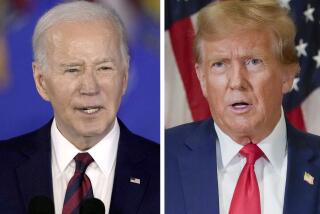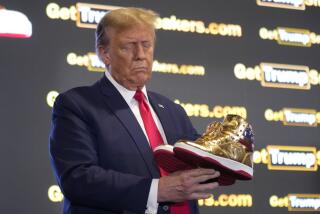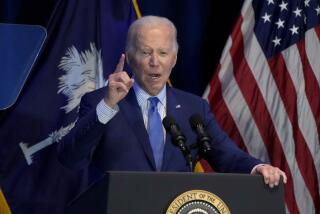Voters Favor Kerry on Financial Issues
- Share via
WASHINGTON — It is no secret that a lack of job creation has emerged as a pivotal election issue. But a new Los Angeles Times Poll suggests that Americans’ pocketbook concerns extend well beyond the labor market, and the public thinks that Democratic presidential candidate John F. Kerry would better look out for their financial futures than would President Bush.
Asked to name the candidate who would be “best at protecting the financial security of the average American,” 47% named Kerry, while 34% picked Bush.
Among independents, a group that could play a crucial role in determining the winner of the presidential election in November, the gap was even wider: 49% for Kerry and 26% for Bush.
Those polled also view the Bush White House as much more aligned with business interests than the interests of ordinary workers, and they express widespread doubts about the integrity of corporate America.
A 63% majority said the president was more concerned about corporations, while 21% said he was more concerned about workers. The view that the president sides with big business over rank-and-file workers has become more prevalent over time. In an August 2002 Times Poll, 55% felt that way.
The results suggest that the economic battleground in the presidential election campaign is taking an untraditional shape that transcends meat-and-potatoes issues such as employment and price levels. These days, people are also concerned about corporate scandal and the integrity of the financial markets -- and the way their leaders are dealing with these matters.
“This poll tells me that Bush’s economic troubles are of the new post-inflation, post-unemployment form,” said Samuel L. Popkin, a UC San Diego political scientist and a Democrat.
It further indicates that “Bush hasn’t been able to convert military security into financial security,” he added.
The Times Poll of 1,616 adults nationwide was conducted between March 27 and March 30. The margin of sampling error is plus or minus 3 percentage points.
In the survey, 69% of those earning less than $50,000 a year saw the president as more concerned with corporations. That figure dipped to 56% among those earning $50,000 or more.
Follow-up interviews with some of those surveyed underscore that Americans have mixed feelings about Bush’s approach to corporate America and the economy.
Greg Voorhees, a registered independent from Bradenton, Fla., feels the economy has changed for the worse, with corporations aiming only for the bottom line, deserting employees for cheap labor overseas and paying top executives “millions and millions while their workers barely get the minimum wage.”
The Bush administration, he is convinced, has been too quick to craft policies that benefit corporate interests at the expense of the public. Ordinary Americans, the 51-year-old said, are not informed of the real agenda on matters ranging from energy policy to drugs and Medicare: The White House, he said, is “hiding something.”
But others disagree. Curtis Blevins, a warehouse worker in northeast Ohio, said he believed the president was helping regular employees by responding to the needs of large corporations.
“Ordinary people work for big business,” said Blevins, 38. “If he doesn’t help big business, ordinary people are out on their duff.... I’m an ordinary person. I work for a big company. The more he helps the big companies, the more we get to hire. The easier our jobs become.”
The poll suggests, however, that many Americans harbor strikingly negative feelings about big companies and those who run them.
Revelations of phony bookkeeping at Enron Corp., WorldCom Inc. and other companies first grabbed public attention more than two years ago. Since then, news of financial scandal has remained highly visible -- most recently centering on the trials of Tyco International Ltd. executives accused of looting their company and of Martha Stewart, who was convicted of lying to investigators about her stock dealings.
Half of those polled said they would describe corporate fraud as “a widespread problem” in a system that is failing; 40% said only “a few corrupt individuals” engaged in such behavior. Three out of four Americans said they could trust executives “only some of the time” or “hardly ever.” Slightly fewer than 1 in 4 said they could trust executives most of the time.
Revelations of fraud also have affected personal behavior. Thirty-seven percent said they were less willing to invest in the stock market in light of the corporate scandals, while 31% said the revelations had not affected their willingness to invest. Many of the rest said they did not own stock.
Almost half of those surveyed -- 45% -- ranked economic issues as the most important problem facing the nation, about the same percentage that put security concerns at the top.
Democrats contend that the ongoing attention to corporate scandal aggravates public worries about financial security, in part because the series of high-profile frauds rattled the stock market and eroded long-term savings accounts for college and retirement. The scandals also raise questions about whether a greedy business elite operates on a different ethical playing field from the rest of society.
“Every day there’s a new scandal on television that makes our point,” said Jenny Backus, a Democratic strategist. “You want to have somebody looking out for the economy that makes sure that corporations play by the rules and stockholders are protected.”
But Republicans maintain that corporate corruption is not an issue that will harm Bush. They often point out that the president has supported Justice Department prosecutions of white-collar criminals and ultimately endorsed sweeping legislation for corporate reform.
“Voters don’t hold the commander in chief in a position of corporate leadership,” said Scott Reed, a Republican consultant. “It’s very difficult for Kerry in his campaign to tie this knot around Bush’s neck.”
Reed asserted that strong economic growth, combined with Bush’s “optimistic message of hope,” presents a winning case for the president when it comes to financial security.
*
(BEGIN TEXT OF INFOBOX)
Financial assessment
Q: ‘He would be the best at protecting the financial security of the average American’: Does this apply more to George W. Bush or more to John Kerry?
Neither 9%
Bush 34%
Kerry 47%
Both equal 2%
Don’t know 8%
Q: Do you think George W. Bush cares more about protecting the interests of ordinary working people, or more about protecting the interests of large business corporations?
Ordinary people 21%
Large corporations 63%
Both 8%
Don’t know 8%
Q: Have corporate scandals in this country made you more willing or less willing to invest in the stock market, or have corporate scandals not played a role in your investing in the stock market one way or the other?
Don’t invest 23%
More willing 6%
Less willing 37%
No role 31%
Don’t know 3%
*
How the Poll Was Conducted
The Times Poll contacted 1,616 adults nationwide by telephone March 27 through 30, 2004. Telephone numbers were chosen from a list of all exchanges in the nation and random digit dialing techniques were used to allow listed and unlisted numbers to be contacted. The entire sample of adults was weighted slightly to conform with census figures for sex, race, age and education. The margin of sampling error is 3 percentage points in either direction. For certain subgroups the error margin may be somewhat higher. Poll results may also be affected by factors such as question wording and the order in which questions are presented.
Source: Times Poll
More to Read
Get the L.A. Times Politics newsletter
Deeply reported insights into legislation, politics and policy from Sacramento, Washington and beyond. In your inbox twice per week.
You may occasionally receive promotional content from the Los Angeles Times.








